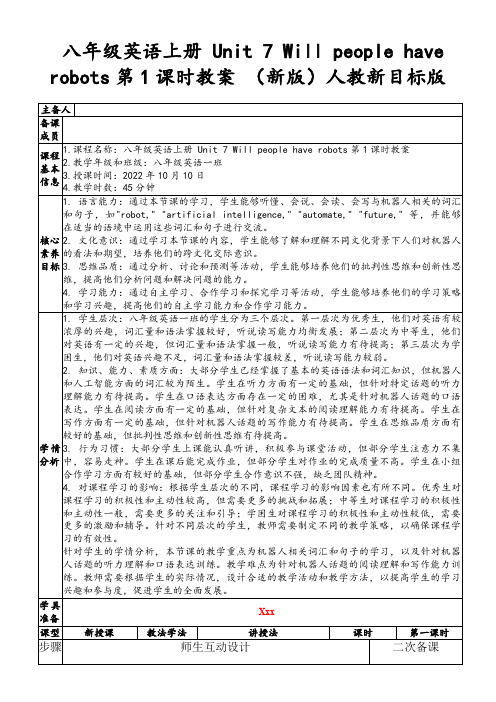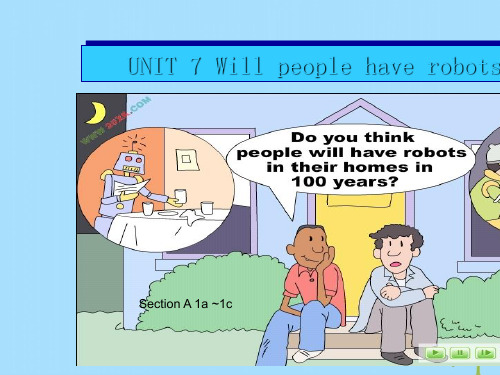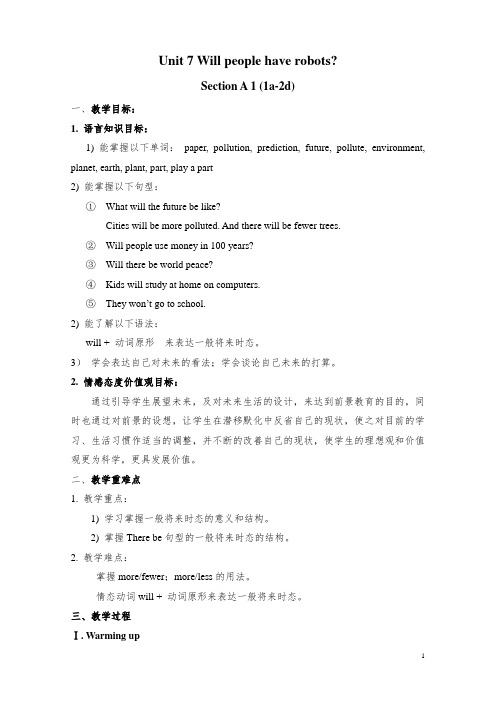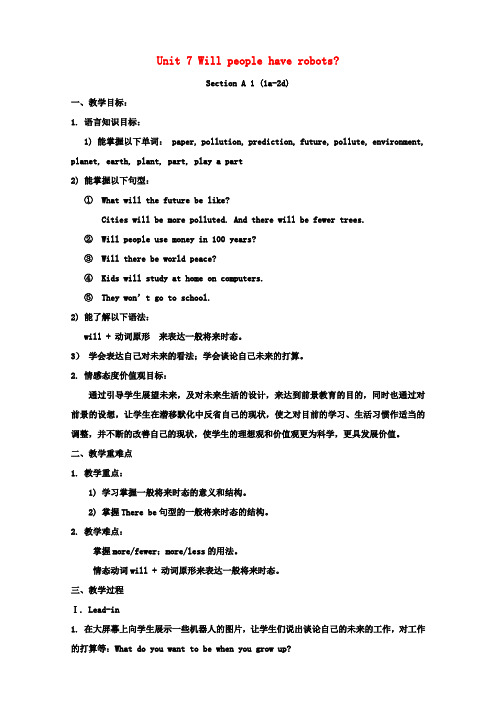八年级英语上册Unit7Willpeoplehaverobots第1课时SectionA1a_2d课时测试题
八年级英语上册 Unit 7 Will people have robots(第1课时)教案 (新版)人教新目标版

3.Finish 1a.
Step3.Listening
1.Listen and circle the predictions you hear in1a.
2.Explain the words:
paper –a piece of paper
5’ILeabharlann terestthe students.
6’
10’
3’
3’
5’
6’
2’
板 书
Unit7 Will people have robots?
1.future-in the future
2. prediction- make a prediction
3.in 100 years
4.pollution-pollute-polluted
情感态度与价值观
Let the students love life.
教材分析
教学重点
Master the use of the simple future tense.
教学难点
Master the words more,less,fewer.
教 学 过 程
教师活动
学生活动
备注(教学目的、时间分配等)
Step6.Exercises
Do some exercises.
Step7.Homework
Make some predictions in pairs.
Think and discuss.
Listen and learn.
Listen and write.
Practice in pairs.
八年级英语上册Unit7Willpeoplehaverobots第1课时教案(新版)人教新目标版

主备人
备课成员
课程基本信息
1.课程名称:八年级英语上册 Unit 7 Will people have robots第1课时教案
2.教学年级和班级:八年级英语一班
3.授课时间:2022年10月10日
例句:I believe that robot technology will bring many benefits to our lives, such as improving productivity and providing assistance in various tasks.
5. 选择一个机器人相关的伦理问题,如隐私保护、责任归属等,写一段话阐述你的观点。
5. 机器人在日常生活中的应用:举例说明机器人在家庭、医疗、教育等领域的应用实例。
6. 机器人伦理和社会影响:讨论机器人伦理问题,如隐私保护、责任归属等,以及机器人对就业、教育和社会生活的影响。
7. 动词一般将来时的用法:讲解动词一般将来时的构成、用法和例句。
8. 将来时态的句子结构:介绍将来时态的句子结构,如主语 + will + 动词原形等。
3. 思维品质:通过分析、讨论和预测等活动,学生能够培养他们的批判性思维和创新性思维,提高他们分析问题和解决问题的能力。
4. 学习能力:通过自主学习、合作学习和探究学习等活动,学生能够培养他们的学习策略和学习兴趣,提高他们的自主学习能力和合作学习能力。
学情分析
1. 学生层次:八年级英语一班的学生分为三个层次。第一层次为优秀生,他们对英语有较浓厚的兴趣,词汇量和语法掌握较好,听说读写能力均衡发展;第二层次为中等生,他们对英语有一定的兴趣,但词汇量和语法掌握一般,听说读写能力有待提高;第三层次为学困生,他们对英语兴趣不足,词汇量和语法掌握较差,听说读写能力较弱。
(人教版)八年级英语上册unit7_will_people_have_robots_第一课时至第五课时_全-2019精选

Please talk with your partner.
There will be… People will have…
1a How will the world be different in the future, 100 year these predictions. Check (√) A (for agree) or D (for disa
A: Where do you live ? B:I live in … . A: Where did you live ten years ago ? B:I lived in … A: What do you do ? / What’s your job ? B: I’m a/an … . A: What do you think you will be in ten years ? B:I think I will be … . A: Where will you live ? B:I will live in … .
evening. will help
• 4. They _____w_i_ll_p(lpalyay) soccer if it doesn
• 5. We _________ (have) a meeting tomor
will have
3a Some more predictions about things.
tenn. is a b.aby
一般将来时:动词在 原形。
3b PAIRWORK Look at activity 3a. Make predictions about Sally.
A: What do you think Sally will be in five years?
人教版八年级英语上册Unit 7 Will people have robots 教案

Unit 7 Will people have robots?Section A 1 (1a-2d)一、教学目标:1. 语言知识目标:1) 能掌握以下单词:paper, pollution, prediction, future, pollute, environment, planet, earth, plant, part, play a part2) 能掌握以下句型:①What will the future be like?Cities will be more polluted. And there will be fewer trees.②Will people use money in 100 years?③Will there be world peace?④Kids will study at home on computers.⑤They won’t go to school.2) 能了解以下语法:will + 动词原形来表达一般将来时态。
3)学会表达自己对未来的看法;学会谈论自己未来的打算。
2. 情感态度价值观目标:通过引导学生展望未来,及对未来生活的设计,来达到前景教育的目的,同时也通过对前景的设想,让学生在潜移默化中反省自己的现状,使之对目前的学习、生活习惯作适当的调整,并不断的改善自己的现状,使学生的理想观和价值观更为科学,更具发展价值。
二、教学重难点1. 教学重点:1) 学习掌握一般将来时态的意义和结构。
2) 掌握There be句型的一般将来时态的结构。
2. 教学难点:掌握more/fewer;more/less的用法。
情态动词will + 动词原形来表达一般将来时态。
三、教学过程Ⅰ. Warming up1. 在大屏幕上向学生展示一些机器人的图片,让学生们说出谈论自己的未来的工作,对工作的打算等:What do you want to be when you grow up?Ss: I want to be a scientist.T: How are you going to do that?Ss: I’m going to study science hard.….2. 学生们根据图片来引导出机器人这一话题。
八年级英语上册 Unit 7 Will people have robots(第1课时)教案

Unit 7 Will people have robots?Section A 1 (1a-2d)一、教学目标:1. 语言知识目标:1) 能掌握以下单词: pap er, pollution, prediction, future, pollute, environment, planet, earth, plant, part, play a part2) 能掌握以下句型:① What will the future be like?Cities will be more polluted. And there will be fewer trees.② Will people use money in 100 years?③ Will there be world peace?④ Kids will study at home on computers.⑤ They won’t go to school.2) 能了解以下语法:will + 动词原形来表达一般将来时态。
3)学会表达自己对未来的看法;学会谈论自己未来的打算。
二、教学重难点1. 教学重点:1) 学习掌握一般将来时态的意义和结构。
2) 掌握There be句型的一般将来时态的结构。
2. 教学难点:掌握more/fewer;more/less的用法。
情态动词will + 动词原形来表达一般将来时态。
三、教学过程Ⅰ. Lead-in1. 在大屏幕上向学生展示一些机器人的图片,让学生们说出谈论自己的未来的工作,对工作的打算等:What do you want to be when you grow up?Ss: I want to be a scientist.T: How are you going to do that?Ss: I’m going to study science hard.….2. 学生们根据图片来引导出机器人这一话题。
泗水县第一中学八年级英语上册Unit7WillpeoplehaverobotsSectionA第1课

第7单元 Will people have robots?Section A 单词paper n.纸;纸张 pollution n.污染;污染物 future n.将来;未来pollute v.污染 environment n.环境 planet n.行星earth n.地球;世界 plant v.种植 n.植物 part n.部分peace n.和平 sea n.海;海洋 build v.建筑;建造sky n.天空 prediction n.预言;预测短语play/take a part 参与;发挥作用 on computers 在电脑上 on paper 在纸上on the earth 在地球上 free time空闲时间 in danger处于危险之中live to be 200 years old活到200岁句型1. People will have robots in their homes.人们的家里会有机器人。
2. Everything will be free.一切东西都将是免费的。
3. Will people live to be 200 years old? 人们会活到200岁吗?Section B 单词apartment n.公寓套房 space n.太空;空间human adj.人的 n.人 dangerous adj.有危险的;不安全的already adv.已经;早已 factory n.工厂Japan 日本 believe v.相信;认为有可能disagree v.不同意;持不同意见;有分歧 even adv.甚至;连;愈加agree v.同意;赞成;应允 shape n.形状;外形fall v.& n.倒塌;跌倒;掉落 n.(美式)秋天 inside adv.& prep.在……里面possible adj.可能存在或发生的;可能的 word n.单词;词impossible adj.不可能存在或发生的;不可能的side n.一方(的意见、态度、立场) probably adv.很可能;大概during prep.在……期间 holiday n.假期;假日短语space station 太空站;宇宙空间站 in the future 在未来hundreds of许多;大量 over and over again 多次;反复地wake up 醒来 fall down突然倒下;跌倒;倒塌look for 寻找;寻求句型1. Today there are already robots working in factories. 现在已经有机器人在工厂里工作了。
八级英语上册Unit7WillpeoplehaverobotsSectionA(1A2d

Hale Waihona Puke A: Do you think there will be robots in people’s homes?
___A___D 1. People will have robots in their homes. ___A___D 2. People won’t use money. Everything will be free. ___A___D 3. Books will only be on computer, not on paper. ___A___D 4. Kids won’t go to school. They’ll study at home on
computers. ___A___D 5. There will only be one country. ___A___D 6. People will live to be 200 years old.
1b Listen and circle the predictions you hear in 1a.
B: Yes, there will. I think every home will have a robot.
A: Will kids go to school? B: No. Kids won’t go to school. They will
study at home on computers. …
2a Listen and circle the words you hear.
八年级英语上册 Unit 7 Will people have robots教案 (新版)人教新目标版

Unit 7 Will people have robots?Section A 1 (1a-2d)一、教学目标:1. 语言知识目标:1) 能掌握以下单词: paper, pollution, prediction, future, pollute, environment, planet, earth, plant, part, play a part2) 能掌握以下句型:① What will the future be like?Cities will be more polluted. And there will be fewer trees.② Will people use money in 100 years?③ Will there be world peace?④ Kids will study at home on computers.⑤ They won’t go to school.2) 能了解以下语法:will + 动词原形来表达一般将来时态。
3)学会表达自己对未来的看法;学会谈论自己未来的打算。
2. 情感态度价值观目标:通过引导学生展望未来,及对未来生活的设计,来达到前景教育的目的,同时也通过对前景的设想,让学生在潜移默化中反省自己的现状,使之对目前的学习、生活习惯作适当的调整,并不断的改善自己的现状,使学生的理想观和价值观更为科学,更具发展价值。
二、教学重难点1. 教学重点:1) 学习掌握一般将来时态的意义和结构。
2) 掌握There be句型的一般将来时态的结构。
2. 教学难点:掌握more/fewer;more/less的用法。
情态动词will + 动词原形来表达一般将来时态。
三、教学过程Ⅰ. Lead-in1. 在大屏幕上向学生展示一些机器人的图片,让学生们说出谈论自己的未来的工作,对工作的打算等:What do you want to be when you grow up?Ss: I want to be a scientist.T: How are you going to do that?Ss: I’m going to study science hard.….2. 学生们根据图片来引导出机器人这一话题。
- 1、下载文档前请自行甄别文档内容的完整性,平台不提供额外的编辑、内容补充、找答案等附加服务。
- 2、"仅部分预览"的文档,不可在线预览部分如存在完整性等问题,可反馈申请退款(可完整预览的文档不适用该条件!)。
- 3、如文档侵犯您的权益,请联系客服反馈,我们会尽快为您处理(人工客服工作时间:9:00-18:30)。
Unit 7 Will people have robots?Unit 7第1课时Section A (1a-2d)测试时间:15分钟测试日期:年月日学生姓名:分数: /15I. 根据句意及汉语提示完成句子1. Please pass me a piece of ______________(纸).2. Air ___________________(污染) is a big problem in this area.3. Do you really care nothing about your ______________(未来)?4. She is not used to the new ______________(环境).5. April is the time to ______________(种植) trees.6. Will we live on another _____ (行星)?II. 单项选择1. _______ an English party in our school this Friday.A. There will beB. There is going to haveC. There will haveD. There is going have2. —Will people live to be 300 years old in the future?—No, ______.A. they aren’tB. they won’tC. they don’tD. they can’t3. —______ do you think the kids will study in 15 years?—They _____ at home on computers.A. Where; studyB. What; will studyC. Where; will studyD. What; study4. We won’t use money, because everything will be _____.A. expensiveB. cheapC. busyD. freeIII. 根据汉语意思完成句子1. 我想每个家庭将有一个机器人。
I think every home _________ _________a robot.2. 或许未来一切都是免费的。
Perhaps everything _________ _____ _________ in the future.3. 我们希望将来污染更少。
We hope _________ _________ _________ _________ pollution in the future.4. 城市在未来将会很大、很拥挤吗?_________ cities _________ very big and crowded in the future?5. 我们可以节约用水,多栽树,人人都应参与保护地球。
We can use less water and__________more trees. Everyone should ____________________ __________ in saving the earth.参考答案I. 根据句意及汉语提示完成句子1. paper2. pollution3. future4. environment5. plant6. planetII. 单项选择1. A there be结构的一般将来时为There will be…或There is/are going to be…,故选A。
2. B 根据问句句意“将来人们会活到300岁吗?”可知为一般将来时,故否定回答为“No,th ey won’t. ”,故选B。
3. C 由上文中的will可知,下文也是一般将来时;由at home可知上文提问的是地点。
故选C。
4. D 由主句意思可知,物品将会是免费的。
故选D。
III. 根据汉语意思完成句子1. will have2. will be free3. there will be less4. Will; be5. plant; play a partUnit 9 Can you come to my party?Unit 9第5课时(Section B 4-Self Check)测试时间:15分钟测试日期:年月日学生姓名:分数: /21I. 根据句意及首字母或汉语提示完成句子1. I wrote several letters to her, but she didn’t (答复) to me.2. My father used to take me to the ____________(音乐会).3. The ____________ (事件) took place many years ago.4. He was sad that most of the g weren’t happy at his birthday party.5. You can find the date of Christmas on the c .6. We will see the _____________(开幕式) of the film next month.II. 用括号中所给词的适当形式填空1. We should make _________________ ( prepare) for the welcome party.2. I’m _______________ (surprise) to see you in Shanghai.3. Ms. Clark came into the classroom without ________________ (say) a word.4. She refused his _________________ (invite) to the party.5. Thank you for __________________ (help) me so much.6. He is planning ______________ (print) some articles for us.7. Miss Smith refused ________________ (answer) the question.8. I’m glad ______________ (see) you again.9. I don’t know if she will ______________ (accept) his gift.10. I would like to invite you to the _______________ (open) of our new store.III. 根据汉语意思完成句子1. 你能在周末的时候来打篮球吗?Can you come to play basketball_________ _________ _________?2. ——你能帮他学法语吗?——当然了,我很乐意。
—Can you help him with French?—Sure, _________ _________ _________.3. 星期日去看望你的祖父母怎么样?_________ _________going to visit your grandparents on Sunday?4. 明天我能够为数学考试而学习。
I’ll_________ _________ _________study for the math test tomorrow.5. 今天放学后我们去听音乐会吧。
_________ _________ _________the concert after school today.参考答案I. 根据句意及首字母或汉语提示完成句子1. reply2. concert3. event4. guests5. calendar6. openingII. 用括号中所给词的适当形式填空1. preparations2. surprised3. saying4. invitation5. helping6. to print7. to answer8. to see9. accept 10. openingIII. 根据汉语意思完成句子1. on the weekend2. I’d love to3. What about/How about4. be able to5. Let’s go toUnit 1 Where did you go on vacation?Unit 1第2课时Section A (Grammar Focus-3c)测试时间:15分钟测试日期:年月日学生姓名:分数: /20I. 根据句意及首字母提示完成句子1. —Would you like s to eat?—Yes, please.2. Money is something, but it is not e .3. —Is e here today?—No, Wang Lin and Zhang Ping are both ill.4. There must be s in the room. We can hear him talking.5. I keep a d in English every day.II. 用所给词的适当形式填空1. The weather _____ (be) hot and humid yesterday.2. They _____ (have) Sichuan food last night.3. —What is Jim doing?—He _____ (do) his homework now.4. The music sounds _____ (relax). I love it very much.5. They _____ (not go) to the beach last Sunday.III. 单项选择1.—Who teaches ________ music?—Nobody. I teach ________.A. mine; myselfB. your; myselfC. you; myselfD. you; yourself2. —How do you like the movie?—I think it’s great, but my brother feels it very_______.A. boredB. boringC. relaxedD. relaxing3. —Tom, I’m going to work. Please look after ______well.—Don’t worry, Mom. I will.A. herselfB. myselfC. yourselfD. himself4. Fishing with Dad was so ________for little Sam that he almost fell asleep.A. excitedB. excitingC. boredD. boring5. —Help _______ to some candies, children.—Thank you.A. youB. yourC. yourselfD. yourselvesIV. 按要求完成句子,每空一词1. They went to Beijing on vacation. (对画线部分提问)__________ __________ they _________ on vacation?2. My vacation was pretty good. (对画线部分提问)___________ ___________ your vacation?3. We had a good time at the party yesterday. (改为一般疑问句)___________ you ___________ a good time at the party yesterday?4. He had noodles for lunch today. (改为否定句)He ___________ ___________ noodles for lunch today.5. —Were they at work last Sunday? (作出否定回答)—_______, ___________ ___________.参考答案I. 根据句意及首字母提示完成句子1. something2. everything3. everyone4. someone5. diaryII. 用所给词的适当形式填空1. was2. had3. is doing4. relaxing5. didn’t goIII. 单项选择1. C 考查反身代词的用法。
